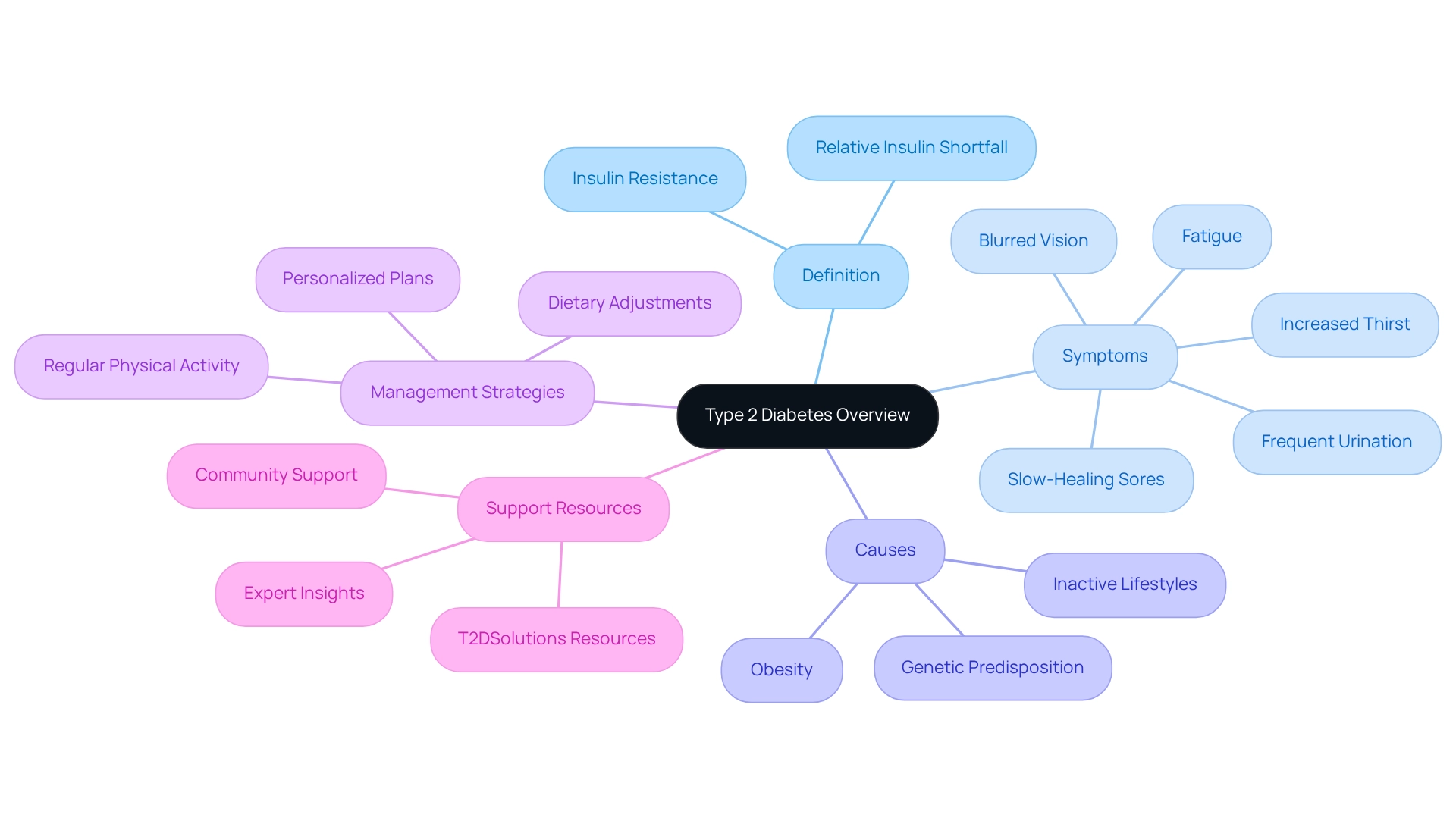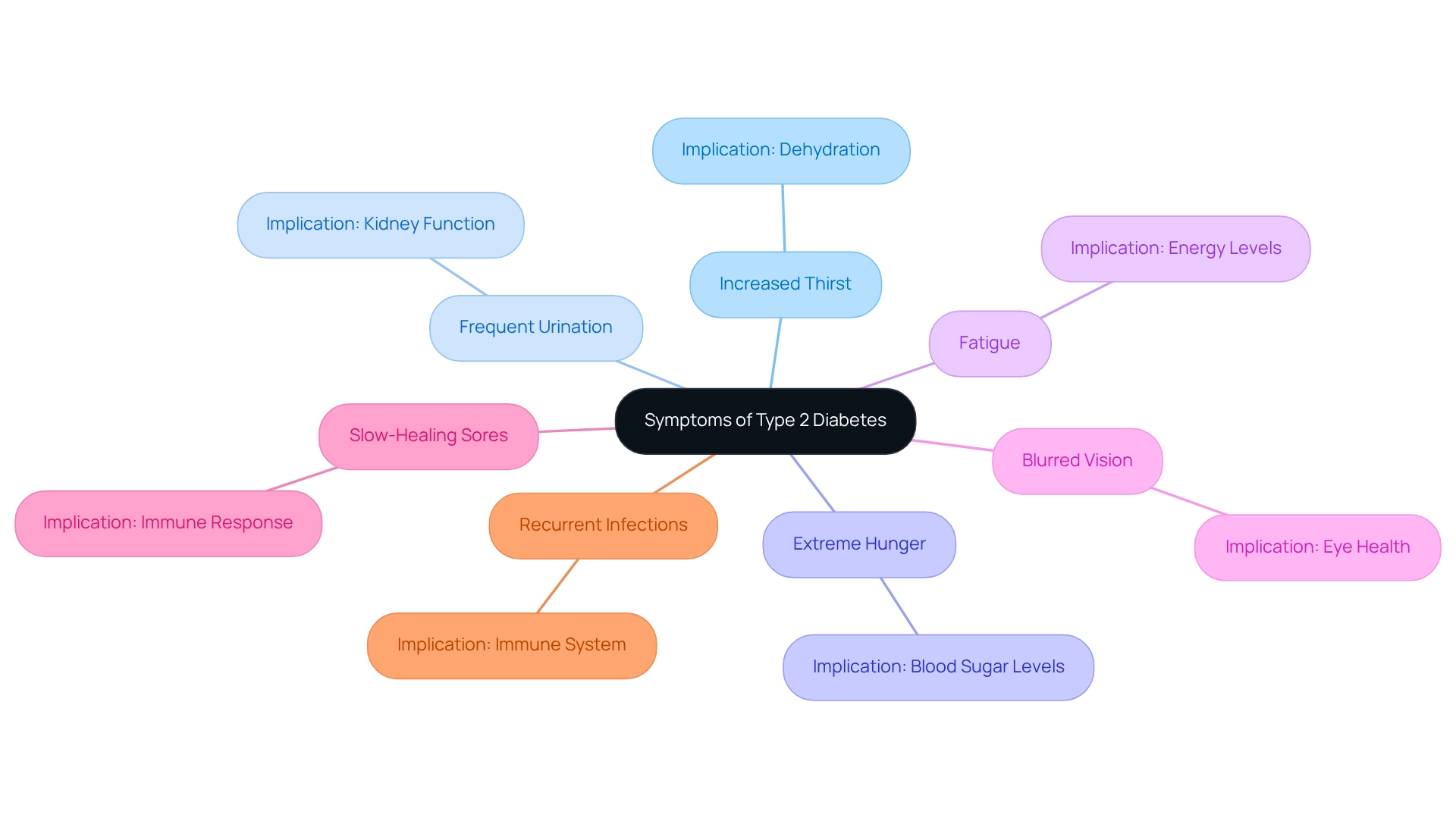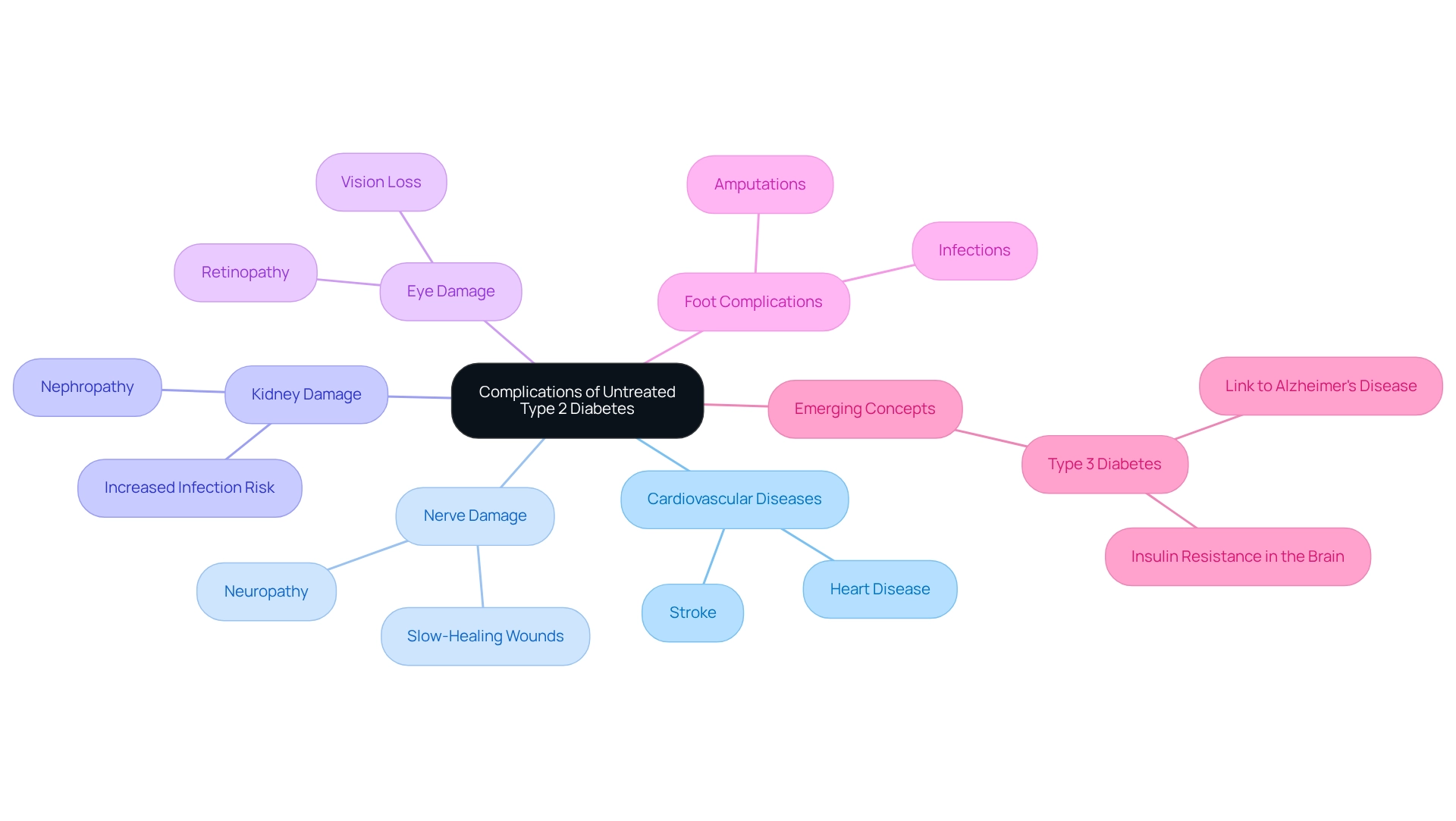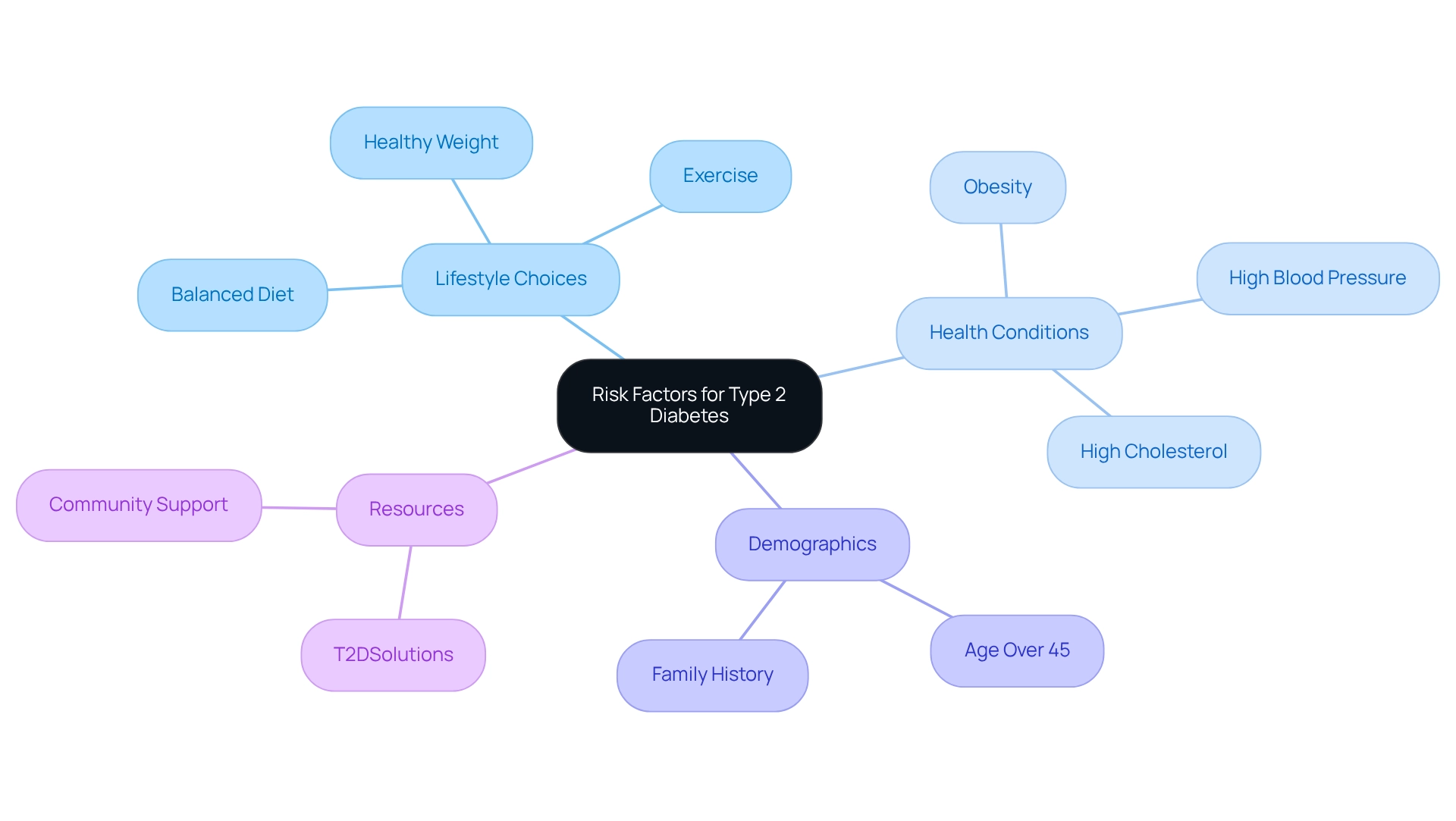Overview
Recognizing the symptoms of Type 2 diabetes is crucial for your health. You may experience:
- Increased thirst
- Frequent urination
- Extreme hunger
- Fatigue
- Blurred vision
- Slow-healing sores
- Recurrent infections
It's understandable to feel overwhelmed by these signs, but knowing them can empower you to take action.
These symptoms arise from elevated blood sugar levels and, if left untreated, can lead to serious complications. Early recognition is vital, as it opens the door to timely medical intervention and effective management strategies. Remember, you are not alone in this journey; support is available.
If you or someone you know is experiencing these symptoms, seeking medical advice can be a significant first step. We are here to support you every step of the way, guiding you towards a healthier future. Don't hesitate to reach out for help—you deserve it.
Introduction
In a world where chronic diseases are increasingly prevalent, Type 2 Diabetes emerges as a significant health concern, impacting millions around the globe. This complex metabolic disorder, marked by insulin resistance and elevated blood sugar levels, is deeply intertwined with modern lifestyle choices, including obesity and physical inactivity. As the prevalence of this condition continues to rise, it's essential to understand its symptoms, complications, and risk factors for effective management.
It's understandable to feel overwhelmed by this information. However, with insights from health professionals and inspiring real-life success stories, you can empower yourself with the knowledge needed to navigate the challenges of Type 2 Diabetes. Remember, you're not alone in this journey. Together, we can explore the resources and support available to help you make informed decisions about your health.
Define Type 2 Diabetes: An Overview
Type 2 diabetes mellitus is a long-lasting metabolic condition that many people face, characterized by insulin resistance and a relative shortfall in insulin production. This leads to increased blood glucose levels. Unlike Type 1 diabetes, where the body cannot generate insulin, individuals with Type 2 can produce insulin, but their bodies do not use it efficiently. This condition often develops slowly and is closely linked to factors such as obesity, inactive lifestyles, and genetic predisposition.
It's concerning to note that the incidence of Type 2 diabetes has surged worldwide, with millions diagnosed each year. This trend reflects troubling patterns related to modern lifestyles. By 2025, it is expected that over 500 million adults will be living with this condition, highlighting the urgent need for effective management strategies to combat this growing epidemic, including understanding what's the symptoms of diabetes type 2, which include:
- Increased thirst
- Frequent urination
- Fatigue
- Blurred vision
- Slow-healing sores
Recognizing these signs early is crucial, as uncontrolled diabetes can lead to serious complications such as heart disease, nerve damage, and kidney failure.
Health experts describe this condition as a complex interplay of genetic and environmental factors. Recent studies emphasize insulin resistance as a primary contributor. Insulin resistance occurs when the body's cells become less responsive to insulin, making it challenging to regulate blood sugar levels. However, it's important to know that lifestyle changes—like dietary adjustments and regular physical activity—can significantly enhance insulin sensitivity and overall health outcomes.
Real-world examples of successful management strategies include personalized dietary plans and structured exercise routines. These approaches have proven effective in controlling blood sugar levels. Insights from case studies, such as those highlighted in T2DSolutions' resources, show that individuals who adopt a proactive approach to their health—emphasizing resilience and determination—can overcome the challenges of diabetes and lead fulfilling lives.
Understanding this condition is essential not only for those affected but also for their families and healthcare providers. It empowers them to make informed decisions and engage in effective disease management. T2DSolutions offers valuable resources, including practical tips and community support, to assist newly diagnosed patients on their journey toward better health. Remember, you're not alone in this journey; we are here to support you every step of the way.

Identify Symptoms of Type 2 Diabetes
Recognizing what's the symptoms of diabetes type 2 is important, as they often manifest subtly. What's the symptoms of diabetes type 2 may include:
- Increased thirst
- Frequent urination
- Extreme hunger
- Fatigue
- Blurred vision
- Slow-healing sores
- Recurrent infections
What's the symptoms of diabetes type 2 arise from elevated blood sugar levels, leading to dehydration and increased urination as your kidneys work to filter excess glucose.
It is essential to identify what's the symptoms of diabetes type 2 in a timely manner. Research indicates that over 50% of people experience what's the symptoms of diabetes type 2 before receiving a diagnosis. For instance, you may find yourself feeling unusually fatigued or excessively thirsty, leading you to wonder what's the symptoms of diabetes type 2, prompting you to seek medical advice. As Jill Scott noted, "When I got my success, I became decadent for a while... I’ve become more moderate since because African-Americans are prone to diabetes." Her experience highlights how many have recognized what's the symptoms of diabetes type 2, which has led to timely interventions.
Medical experts emphasize that being aware of what's the symptoms of diabetes type 2 can significantly impact your management and outcomes. You're not alone in this journey; many have walked this path and found support. T2DSolutions offers comprehensive diabetes education resources and community support, empowering you with the knowledge needed to recognize what's the symptoms of diabetes type 2 and manage your diabetes effectively. Remember, we are here to support you every step of the way.

Understand Complications of Untreated Type 2 Diabetes
Untreated Type 2 Diabetes can lead to serious complications that significantly impact both health and quality of life. It's concerning to note that cardiovascular diseases are prevalent in this population; studies reveal that individuals with Type 2 Diabetes are two to four times more likely to develop heart disease or suffer a stroke compared to those without the condition. Additionally, high blood sugar levels can cause nerve damage (neuropathy), kidney damage (nephropathy), and eye damage (retinopathy), potentially resulting in severe consequences, including amputations due to foot complications.
The lasting effects of prolonged high blood sugar are substantial, as they can damage blood vessels and nerves, increasing the risk of heart attacks and strokes. Many individuals may also experience challenges such as slow-healing wounds and a heightened susceptibility to infections, complicating their overall health management. At T2DSolutions, we recognize the importance of addressing these complications and providing support for newly diagnosed patients. Our resource hub offers educational materials and community assistance to help individuals understand and navigate these challenges effectively.
Expert opinions underscore the necessity of open communication with healthcare providers to tackle these issues. Endocrinologists stress that early intervention and consistent monitoring are crucial in preventing complications. For instance, a couple who successfully lost 118 pounds together without medication illustrates how significant lifestyle changes can lead to better health outcomes and potentially reduce the risk of diabetes-related issues. Recent studies continue to highlight the complications associated with unmanaged Type 2 Diabetes, reinforcing the importance of awareness and proactive management.
Moreover, the emerging concept of Type 3 Diabetes, which is linked to Alzheimer’s disease and insulin resistance in the brain, highlights the need for a comprehensive understanding and preventive care. By being aware of these potential health challenges, individuals may feel more motivated to engage in effective diabetes management and seek regular medical care, ultimately leading to improved health and well-being. Remember, you're not alone in this journey; we are here to support you every step of the way.

Explore Risk Factors for Type 2 Diabetes
Condition 2 related to blood sugar levels is influenced by several factors, including obesity, lack of exercise, and age, particularly for those over 45. It's important to recognize that family history and certain ethnic backgrounds can also significantly affect susceptibility. Recent statistics reveal a troubling link between rising obesity rates and an increased risk of developing a second form of diabetes, with over 42% of adults classified as obese by 2025. Furthermore, conditions like high blood pressure and high cholesterol can heighten this risk.
Lifestyle choices play a crucial role in managing these factors. By maintaining a healthy weight, engaging in regular physical activity, and following a balanced diet, individuals can greatly reduce their chances of developing Type 2 conditions. Real-life stories illustrate that those who embrace these lifestyle changes often see remarkable improvements in their health. For instance, participants in the National Diabetes Prevention Program have shared their successes in weight loss and reduced diabetes risk through structured lifestyle modifications.
T2DSolutions serves as a vital resource for those recently diagnosed, offering educational materials and community support to help individuals understand and manage their diabetes. Experts emphasize the importance of addressing obesity as a key factor in diabetes prevention. Health professionals advocate for community support and education to cultivate healthier habits. As Nick Jonas wisely stated, "It’s just about knowing how to manage your specific diabetes... Once you get a handle on it, it’s okay." By recognizing these risk factors and leveraging resources from T2DSolutions, individuals can make informed choices about their health and pursue preventive care, ultimately leading to better management of their diabetes risk.

Conclusion
Type 2 Diabetes represents a growing global health crisis, deeply rooted in modern lifestyle choices and marked by its complex interplay of genetic and environmental factors. Understanding this condition, along with its symptoms and potential complications, is crucial for effective management. It's understandable to feel overwhelmed, but recognizing early signs such as increased thirst, fatigue, and slow-healing sores can empower you to take proactive steps towards better health. By doing so, you can potentially avoid severe consequences like cardiovascular diseases and nerve damage.
Moreover, addressing the risk factors associated with Type 2 Diabetes—like obesity, physical inactivity, and age—can significantly reduce the likelihood of developing this condition. Lifestyle modifications, including maintaining a healthy diet and engaging in regular exercise, have shown remarkable success in improving health outcomes. Real-life success stories remind us that determination and informed choices can lead to a fulfilling life, despite the challenges posed by diabetes.
Ultimately, the journey towards managing Type 2 Diabetes is not one to be faced alone. Resources like T2DSolutions provide essential support and education, empowering individuals and their families to make informed decisions about their health. We are here to support you every step of the way. By fostering a community of understanding and resilience, you can navigate the complexities of diabetes management, transforming challenges into a pathway for better health and well-being.
Frequently Asked Questions
What is Type 2 diabetes mellitus?
Type 2 diabetes mellitus is a long-lasting metabolic condition characterized by insulin resistance and a relative shortfall in insulin production, leading to increased blood glucose levels.
How does Type 2 diabetes differ from Type 1 diabetes?
Unlike Type 1 diabetes, where the body cannot generate insulin, individuals with Type 2 diabetes can produce insulin but do not use it efficiently.
What factors contribute to the development of Type 2 diabetes?
Type 2 diabetes often develops slowly and is closely linked to factors such as obesity, inactive lifestyles, and genetic predisposition.
What is the expected trend for Type 2 diabetes incidence by 2025?
By 2025, it is expected that over 500 million adults will be living with Type 2 diabetes, reflecting a concerning trend related to modern lifestyles.
What are the common symptoms of Type 2 diabetes?
Common symptoms include increased thirst, frequent urination, fatigue, blurred vision, and slow-healing sores.
Why is early recognition of Type 2 diabetes symptoms important?
Early recognition is crucial because uncontrolled diabetes can lead to serious complications such as heart disease, nerve damage, and kidney failure.
What is insulin resistance?
Insulin resistance occurs when the body's cells become less responsive to insulin, making it challenging to regulate blood sugar levels.
How can lifestyle changes impact Type 2 diabetes management?
Lifestyle changes, such as dietary adjustments and regular physical activity, can significantly enhance insulin sensitivity and improve overall health outcomes.
What are some effective management strategies for Type 2 diabetes?
Effective management strategies include personalized dietary plans and structured exercise routines that have proven effective in controlling blood sugar levels.
How can T2DSolutions assist those affected by Type 2 diabetes?
T2DSolutions offers valuable resources, practical tips, and community support to assist newly diagnosed patients on their journey toward better health.



